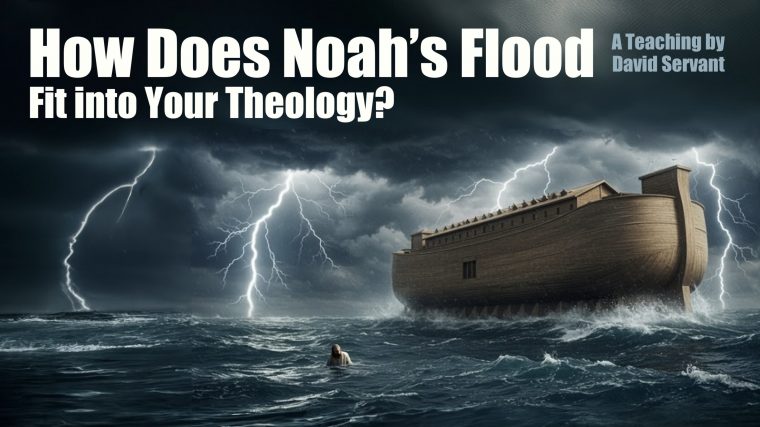
In past years, and recently, I’ve seen a Facebook post that is being repeatedly shared, titled, “How Does the Thief on the Cross Fit into Your Theology?” The text communicates several messages. One of them seems to be that, because a man who had a few hours to live was never baptized, volunteered to help others, took the Lord’s Supper, went on a mission trip and so on, but was promised Paradise by Jesus, that proves God doesn’t expect anything from those of us who have decades of life remaining to serve Him. It’s a little different twist on the very popular “false-grace message.” How false-grace preachers love to isolate and twist passages of Scripture!
Because the incident of Jesus forgiving the repentant thief on the cross isn’t the only story in the Bible, I’d like to ask a very legitimate question: How Does Noah’s flood fit into your theology?
The reason is because the Jesus who forgave the repentant thief on the cross is the same Jesus who once destroyed the majority of the world’s people by a flood. Jesus said that He and His Father are one, so we shouldn’t imagine Jesus’ Father pouring out His wrath upon the whole world in the form of a flood while Jesus whispered to an angel, “Wow, I would never do such a thing!” No, it is theologically safe to say that Jesus caused the flood of Noah, and He drowned most of the world’s population, preserving only one family.
I won’t go into the details, but I’m sure you can imagine the horror of people desperately crawling to higher ground, all to no avail.
I know some will say, “That’s not the Jesus whom I know and love!” And that is probably true, but only because those folks have carved an idol to their liking and named him “Jesus.” But one day when they stand before Jesus, He won’t be the idol they carved. He will be Bible Jesus. And Bible Jesus not only poured out His wrath upon the entire earth in the past, He’s going to do it again in the future in an even more dramatic fashion. Peter wrote:
It escapes their notice that by the word of God the heavens existed long ago and the earth was formed out of water and by water, through which the world at that time was destroyed, being flooded with water. But by His word the present heavens and earth are being reserved for fire, kept for the day of judgment and destruction of ungodly men….
The Lord is not slow about His promise, as some count slowness, but is patient toward you, not wishing for any to perish but for all to come to repentance. But the day of the Lord will come like a thief, in which the heavens will pass away with a roar and the elements will be destroyed with intense heat, and the earth and its works will be burned up” (2 Pet. 3:5-7, 9-10).
Apparently, Noah’s flood fit into the theology of Peter, who personally lived and traveled with Jesus for three years. So he knew Jesus quite well. He believed God is patiently waiting for people to repent, just as He did in the days of Noah, but He is not going to wait forever, just like in the days of Noah. The day of the Lord will “come like a thief,” just as Jesus promised, and “the earth and its works will be burned up.” Not a flood. Fire.
Why did Peter remind his Christian readers, whom he called—”those who have received a faith of the same kind as ours” (2 Pet. 1:1)—of these things? He reveals his reason in the very next verse: “Since all these things are to be destroyed in this way, what sort of people ought you to be in holy conduct and godliness” (2 Pet. 3:11-13).
Peter hoped to motivate his Christian readers to “holy conduct and godliness.” To paraphrase, he hoped to motivate them to keep all of Jesus’ commandments every day. Do you suppose Peter would have ever told any of his audiences the story of the thief on the cross as a means to help them think that God didn’t expect anything more of them than He did that dying thief? “From everyone who has been given much, much will be required” said Jesus (Luke 12:48).
So, how does Noah’s flood fit into your theology? Here is even a better question: How does the whole Bible fit into your theology?
Food for thought!

